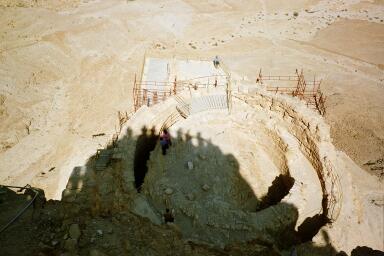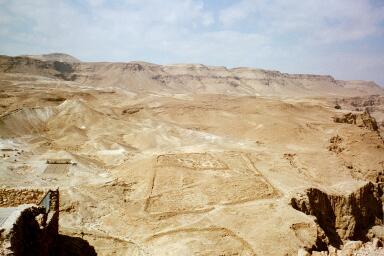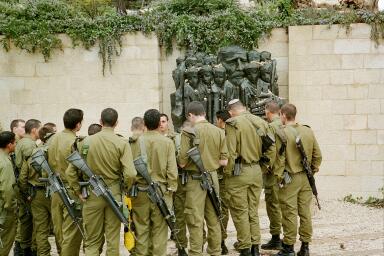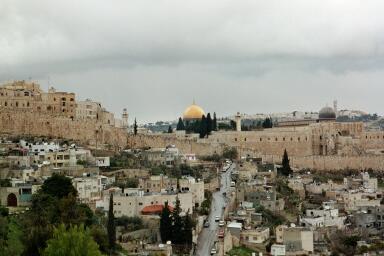Masada, Yad Vashem - the Quest for Peace
Reading: Luke 19.41-44
Those who would understand the tenacity with which the Jews hold onto the land of Israel need to grasp the significance of Masada and Yad Vashem. The former is the site of the last Jewish resistance to the Romans – it fell in 74AD. The latter is the memorial to the Jews who died in Nazi death camps in World War II. An estimated 6.7 million Jews, including 1.5 million children, were gassed in an attempt to rid Europe of all Jews.
 Masada was a mountain fortress near the Dead sea. We were thankful for the video which interpreted the historical background of the ruins. We were also glad to ascend by cable car – though the energetic can climb up by the "snake path" on the east or the Roman seige ramp on the west.
Masada was a mountain fortress near the Dead sea. We were thankful for the video which interpreted the historical background of the ruins. We were also glad to ascend by cable car – though the energetic can climb up by the "snake path" on the east or the Roman seige ramp on the west.
The first fortifications on Masada were built between 103 and 76BC, as part of the Hasmonean revolt against Greek rule.
The last of the Hasmonean high-priestly kings was executed in 37BC and the pro-Roman Herod the Great began a new era. In 43BC Herod – the Herod of the Christmas story – took over the existing fortifications at Masada and did extensive building there including two splendid palaces. He was "hedging his bets" – in case he fell out with the Romans and in case the Jews got nasty – to provide himself a "way out" in the event of trouble from the Jews or the Romans. However, he died in 4BC without having to make use of it.
 Following the Jewish revolt against Rome in 66AD, a group of Zealots from Galilee captured the lightly-defended Masada and it became a refuge for fleeing Jews. The resistance fighters of Masada had provisions for a long siege.
Following the Jewish revolt against Rome in 66AD, a group of Zealots from Galilee captured the lightly-defended Masada and it became a refuge for fleeing Jews. The resistance fighters of Masada had provisions for a long siege.
After suppressing the uprising in Palestine, the Romans turned their attention to Masada. They set up a camp on the high ground west of Masada and built a wall around the mountain to prevent escape. They used Jewish slave labour to build a siege ramp – they knew the defenders couldn’t kill fellow-Jews. When they finally stormed the fortress, it was silent and empty – the defenders had fulfilled a suicide pact rather than be taken by the enemy.
From 74AD to 1948AD the Jews held no part of their land.
The name "Yad Vashem" comes from the Hebrew of Isaiah 56.5 – translated by NIV "a memorial and a name." It is a memorial to the people and events of the Holocaust. It records the tragic events of persecution, flight and death camps which pre-cipitated the formation of the modern State of Israel.
 The memorial covers a large area and is still being extended. School groups and soldiers are brought here to learn the reality of recent Jewish history. The scene pictured here commemorates a Polish Jew who cared for children. When they were taken into the camps he went with them. When they died in the gas chambers, he died there too.
The memorial covers a large area and is still being extended. School groups and soldiers are brought here to learn the reality of recent Jewish history. The scene pictured here commemorates a Polish Jew who cared for children. When they were taken into the camps he went with them. When they died in the gas chambers, he died there too.
"A land without a people for a people without a land" became the slogan of the Zionist movement in the late 19th century. This slogan failed to take account of the fact that, under Turkish rule, Palestine had become home to a significant Arab population, although one that lacked national identity. In the term to which we Australians have become familiar, it was not terra nullius.
Some Israeli Defence Force units have been sworn in at Masada – together with an oath that "Masada shall not fall again." This history underlying Masada and Yad Vashem is significant. Understandably the Jews don’t want to forget it – and don’t want the rest of the world to forget it either. But it is one thing to have secured a homeland. It is another to keep it secure. The displacement of so many Palestinians has led to continued unrest and hostility. The issues are so major and numerous that the quest for peace in the area is very complex indeed.
Jesus was approaching Jerusalem (on what we call Palm Sunday). When he saw the city, he wept over it.
"If you, even you, had only known on this day what would bring you peace – but now it is hidden from your eyes" (Luke 19.42).
The very name of Jerusalem includes the Hebrew word shalom, "peace" – still the regular greeting in Israel.
 Jesus was sad because peace was being offered to them, but they were missing out on the opportunity altogether. Instead of welcoming him as the Prince of Peace, they would have him executed. And up ahead were dark days. Their city and nation would be in ruins.
Jesus was sad because peace was being offered to them, but they were missing out on the opportunity altogether. Instead of welcoming him as the Prince of Peace, they would have him executed. And up ahead were dark days. Their city and nation would be in ruins.
It happened then – and the Jews are still seeking shalom. In some reflections I wrote on returning to Australia – "The only possible solution seems to lie in a radical change of heart on all sides – quite specifically that Jew and Moslem both come to trust in the one who is the Prince of Peace. That ‘peace process’ was costly – and there will also be costs to both Jew and Moslem in such a change of heart."
When will we ever learn? Yes, we are seeking peace too – world peace, personal peace… Thankfully, we aren’t facing bullets and bombs, yet we live under high levels of stress.
Jesus is still the Prince of Peace. He said, "Come to me, all you who are weary and burdened, and I will give you rest. Take my yoke upon you and learn from me, for I am gentle and humble in heart, and you will find rest for your souls. For my yoke is weary and my burden is light" (Matthew 11.28-30).
This shalom is sealed with his own blood. The offer stands. Come to him and know "what brings us peace."
| PRAYER: Yes, Lord! We need some peace. A spell from hard work would be good. Yet we need peace in the midst of hard work and pain, disappointment and discouragement. You endured misunderstanding, rejection, suffering,and death… to bring us a peace that can never be taken from us. Lord, we come to you – to trust you, to know your peace. Thanks, Lord! Amen. |
Shalom!
Weeping Lord,
you know
this bruised
and broken
world.
You lived here –
and died
a brutal death.
They didn’t know
you came in peace,
nor that in blood
that human hands had shed
you sealed
shalom
for all
who would believe.
Weary
and burdened
I come to you
to receive
your gift –
shalom!
Amid
the troubled burdens
that afflict,
teach me
to live
in your shalom!
© Peter J. Blackburn, Burdekin Blue Care Devotions, 31 July
2001
More photos of Israel are available here.
Except where otherwise noted, Scripture quotations
are from the New International Version, © International
Bible Society, 1984.
Back to Sermons
 Masada was a mountain fortress near the Dead sea. We were thankful for the video which interpreted the historical background of the ruins. We were also glad to ascend by cable car – though the energetic can climb up by the "snake path" on the east or the Roman seige ramp on the west.
Masada was a mountain fortress near the Dead sea. We were thankful for the video which interpreted the historical background of the ruins. We were also glad to ascend by cable car – though the energetic can climb up by the "snake path" on the east or the Roman seige ramp on the west. Following the Jewish revolt against Rome in 66AD, a group of Zealots from Galilee captured the lightly-defended Masada and it became a refuge for fleeing Jews. The resistance fighters of Masada had provisions for a long siege.
Following the Jewish revolt against Rome in 66AD, a group of Zealots from Galilee captured the lightly-defended Masada and it became a refuge for fleeing Jews. The resistance fighters of Masada had provisions for a long siege. The memorial covers a large area and is still being extended. School groups and soldiers are brought here to learn the reality of recent Jewish history. The scene pictured here commemorates a Polish Jew who cared for children. When they were taken into the camps he went with them. When they died in the gas chambers, he died there too.
The memorial covers a large area and is still being extended. School groups and soldiers are brought here to learn the reality of recent Jewish history. The scene pictured here commemorates a Polish Jew who cared for children. When they were taken into the camps he went with them. When they died in the gas chambers, he died there too. Jesus was sad because peace was being offered to them, but they were missing out on the opportunity altogether. Instead of welcoming him as the Prince of Peace, they would have him executed. And up ahead were dark days. Their city and nation would be in ruins.
Jesus was sad because peace was being offered to them, but they were missing out on the opportunity altogether. Instead of welcoming him as the Prince of Peace, they would have him executed. And up ahead were dark days. Their city and nation would be in ruins.